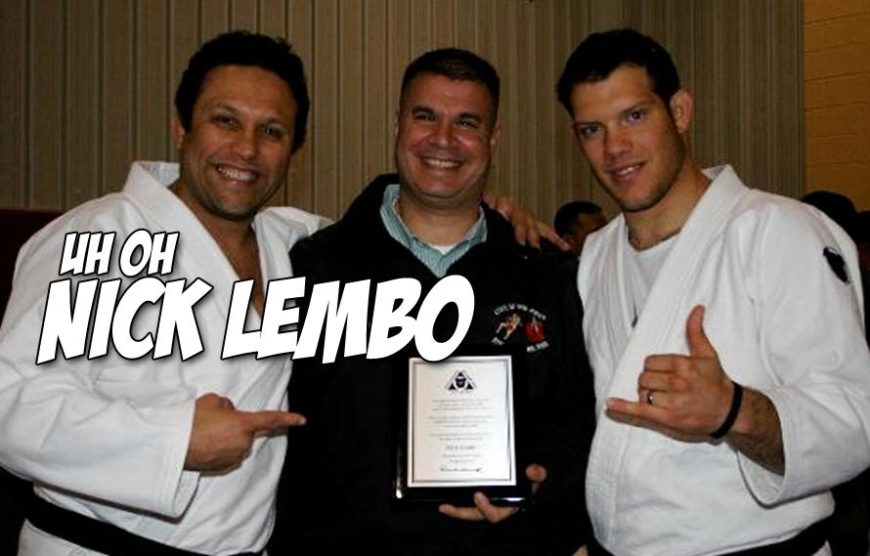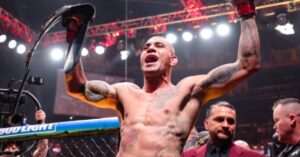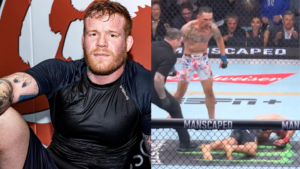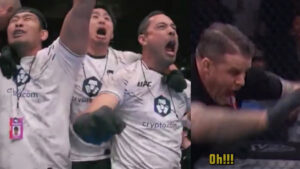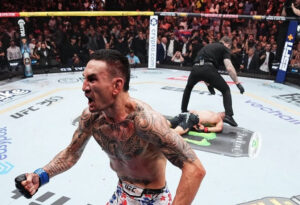Conventional wisdom says that it is good to be King. But the royal sash may seem a bit greener when seen from the other side of the castle’s drawbridge. For instance, in January of this year, Nevada State Athletic Commission executive director Keith Kizer resigned amid controversy over the state of judging in Nevada. Now, the owner of anonymous website lembomustgo.com is accusing New Jersey State Athletic Control Board’s Nick Lembo of impropriety. Specifically, the Counsel and Administrator of New Jersey’s MMA program offered former UFC fighter Ricardo Almeida a MMA judging license in 2011, and the appointment is being deemed an inappropriate conflict of interest.
In part, the website asks:
Did Mr. Almeida go through the same training process as every Judge in the NJ MMA Judging system?
Did Mr. Almeida Judge any amateur shows, shadow existing Judges, and work within the system?
Or was he assigned immediately to main event fights for the largest promotions, including the UFC?
Was Mr. Almeida allowed to maintain ownership of an MMA academy, and train fighters that competed in NJ, and other states?
Was Mr. Almeida allowed to CORNER FIGHTERS, then JUDGE FIGHTS, at the SAME EVENT, while WEARING SPONSOR’S LOGO’ED MERCHANDISE?
Did Mr. Almeida appear for an ENTIRE SEASON’S TELEVISED EPISODES of “The Ultimate Fighter”, as Frankie Edgar’s Trainer and cornerman?
Did Mr. Almeida appear on national television in sponsor’s clothing cornering Frankie Edgar in his fight against BJ Penn on July 6th, 2014, while holding a VALID LICENSE as a JUDGE in the state of New Jersey?
If there was a need for former fighters as Judges that Mr. Lembo felt compelled to fill, would it not have been wiser to post a notice, accept applications, and screen, vet, and try out a number of former fighters as part of an honest selection process, rather than award a license to someone with glaring conflicts of interest, and clear financial connections to fighters and sponsors?
Has Mr. Lembo offered any other former fighters positions as Judges and allowed them to bypass the qualification criteria all other NJ Judges are held to, except Mr. Almeida?
Do any of Mr. Lembo’s other officials have conflicts of interest or overlapping loyalties that could potentially erode the public trust in the Commission?
I spoke briefly to Nick Lembo. He was not available to offer a formal response because it is his day off.
But the pointed questions aren’t exactly new. They have just never been asked in connection with a campaign to oust Lembo. On April 30, 2012, ESPN reporter Franklin McNeil reported about former UFC welterweight Ricardo Almeida’s debut as a UFC judge. According to Almeida, he became interested in becoming a UFC judge after he perceived the system failed him in a close fight he lost against Mike Pyle at UFC 128.
“As a fighter, I’ve been on the wrong end of a couple of bad decisions, fights I thought I’d won but lost,” he told ESPN.com. “The one closest to my heart is the last fight in Jersey.”
“It was close, but I thought I won that fight.”
According to Almeida, Lembo invited him to join the Commission. “Nick Lembo invited me and I’ve had a great relationship with the New Jersey State Athletic Control Board and I accepted right away.” The two had prior professional contact in 2008, when Ricardo joined a nine-member committee headed by Lembo that was designed to determine whether or not changes or amendments to the Uniform Rules of Mixed Martial Arts was required. Other panel members were Renzo Gracie, Steven Haigh, Jeremy Horn, Matt Hughes, Tara LaRosa, Pat Miletich and BJ Penn.
ESPN reporter McNeil acknowledged in his article that there was potential for a perceived conflict of interest, given that Almeida was still running a gym in Hamilton, New Jersey, “where several high-profile fighters train, including former champion Frankie Edgar.”
But Lembo assured ESPN that Almeida would never be assigned to judge a bout that had a direct impact on one of his fighters.
“Obviously that is not going to happen,” Lembo said. “There are disclosure forms and conflict of interest forms that every official has to fill out. If anything, Ricardo has voluntarily disclosed some things that I didn’t even think, as the commission attorney, disqualified him it wouldn’t be an issue.” Almeida agreed, saying “I don’t want to be part of a fight where there is any conflict of interest of any kind. I’ve trained with Jim Miller and we’re very close with Nate Diaz.”
In a September 2013 interview with Vice’s Fightland, Almeida repeated the sentiment. “I haven’t been able to judge some of the major cards here in Jersey because I’ve had some of the guys that I train on the card, and that’s a conflict of interest. I cannot be judging one fight and then coaching somebody in another one—it doesn’t look good for anybody. Doing jury duty and defending somebody on the same case–I don’t think that would fly, you know?”
And in February of this year, Almeida explained that he discusses potential conflicts with Lembo before he is appointed to judge a fight. “When they show me the assignments, I told Nick, ‘Hey Nick, we just recorded the show against B.J. Penn. Frankie fought Aldo. I just want to let you know of this in case any controversy comes up down the line’ and he’s like ‘`You know, Ricardo, I brought the assignments to both camps and they were ok with it.’ To me, as long as they’re ok, I’m a fan of fighting. I like great fighters and I want to see the guy who wins, win.”
The question, then, is whether conflict of interest forms and the assurances of Almeida to be impartial are enough. Perhaps they are. But even assuming Almeida is truly impartial, the appearance of possible impropriety could affect the public’s confidence in the New Jersey State Athletic Control Board. After all, Lembo is not just accountable to the fighters, he is accountable to the public.
In a business that has sometimes been touched by cronyism, avoiding an appearance of conflict should be the default position. And even if fighters agree to waive a disclosed conflict, the public hasn’t had any opportunity to respond. They are likely not even aware of it. That is especially relevant, given the existence of gambling in Mixed Martial Arts. But there is no evidence that the betting public is being notified of potential conflicts before they wager.
There are no hard and fast rules for balancing the benefit of hiring an experienced judge against the risk that he will engage in partiality. But MMA judging is a remarkably subjective enterprise. And razor-thin fights like Almeida’s against Mike Pyle routinely occur. Because the resulting score card often depends on small, even unconscious, observations from a judge, the public should at least be informed when a potential conflict of interest may affect the outcome. And while the issue has been raised in interviews, and generally disclosed at the time Almeida was appointed, it is unclear whether the public at large is aware.

